Case 2
(As always, I have altered some of the data to protect the identity of the psychologist and the family):
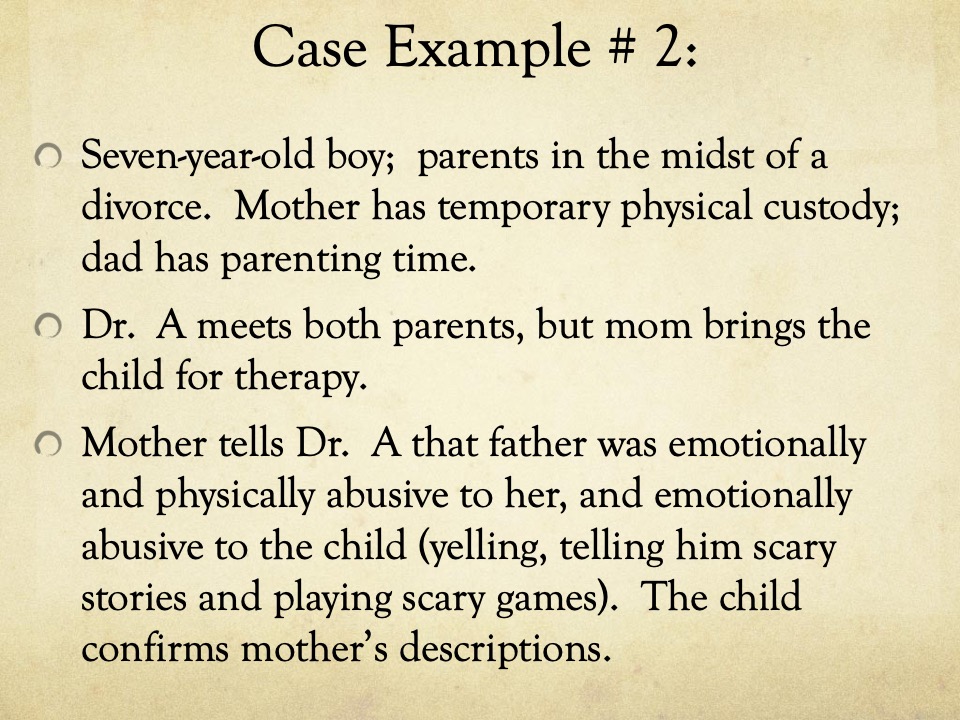
A child therapist sees a seven-year-old boy, whose parents are in the midst of their divorce. Mother has temporary physical custody. Dad has parenting time. (he moved out to live with his girlfriend, later his wife)
The CIT, Dr. A. meets both parents during the evaluation and treatment planning, but the mother is the one who brings the child to visits. Dad has been to one visit with the therapist for the purpose of giving history, and one session to discuss treatment planning.
Mother tells the CIT/therapist that father was emotionally and physically abusive to her during the marriage, and was emotionally abusive to the child, frightening the boy by yelling at him and mom, telling him scary stories and playing scary games with the child. The child confirms mother’s descriptions, saying that the dad has repeatedly scared him. The therapist becomes concerned about verbal/psychological abuse, and feels a need to report.
The CIT contacts CPS, who recommend a suspension of parenting time during their investigation, but do not substantiate abuse
The CIT then writes to the court, suggesting that dad’s parenting time be suspended indefinitely, and that a custody evaluation be performed, because he feels that the child is legitimately scared of dad, to whom the therapist refers to as “abusive and sadistic”. He believes that he is advocating for and attempting to protect the child.
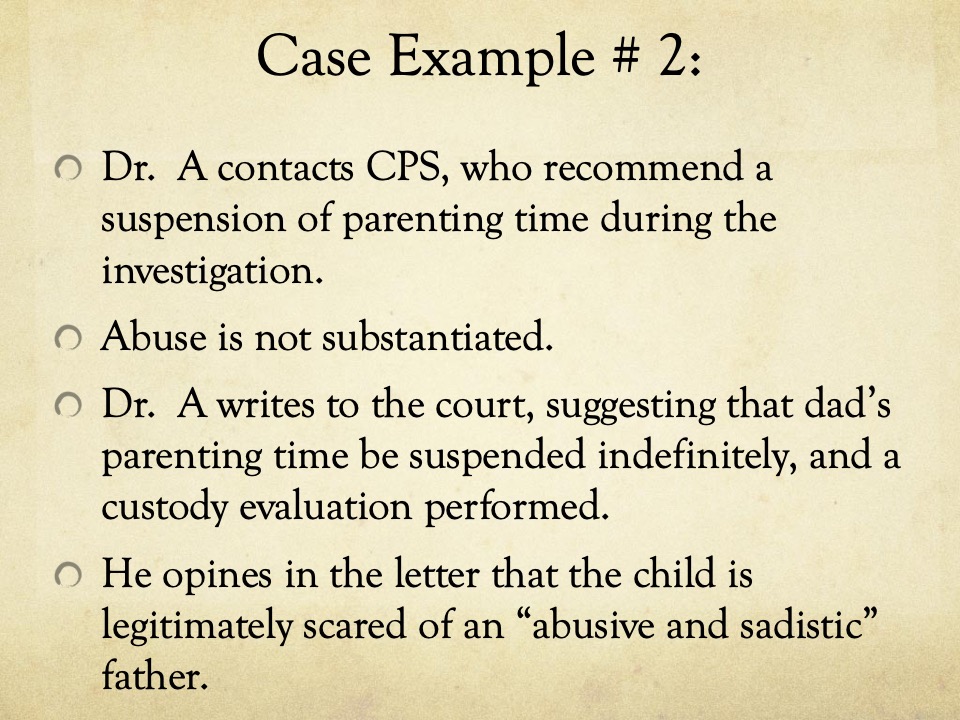
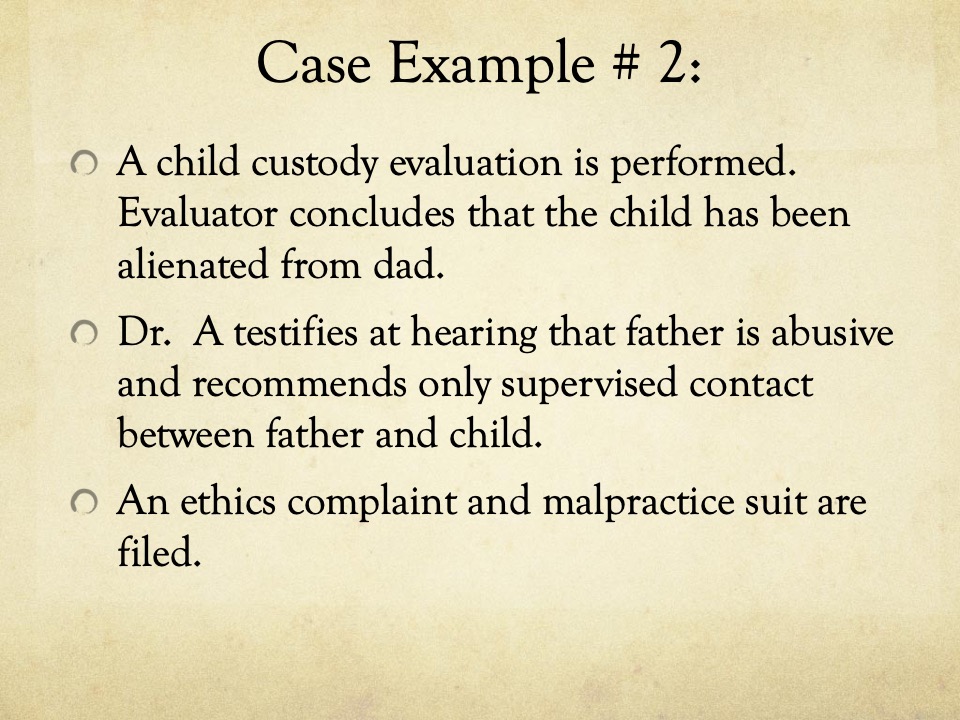
The court suspends father’s parenting time, takes several months to decide that a custody evaluation should be done, then refers the case to a forensic psychologist.
The child does not see the father for more than six months prior to the forensic psychologist’s evaluation, and for over a year before the case lands back in court.
The evaluator concludes that the child has been alienated from his father. He notes that mother and son use the exact same and very peculiar words to describe the father, that the child’s stories about his dad either lack details, do not make sense, or do not fit the picture of an emotionally or physically abusive dad. Dad’s psychological evaluation does not support the allegations, and mother comes across as both vindictive and disturbed psychologically.
Mom’s attorney calls for an evidentiary hearing, finds experts to back up his client (although they don’t see the dad).
Dr. A, the CIT, who has continued to see the child, testifies in court that he believes that the father is a sadistic and abusive man, that it does not matter what the evaluator says, because, in his opinion, the child is truly afraid of his father. He recommended no unsupervised contact between the child and his father.
A complaint is filed with APA and Dr. A is sued for malpractice.
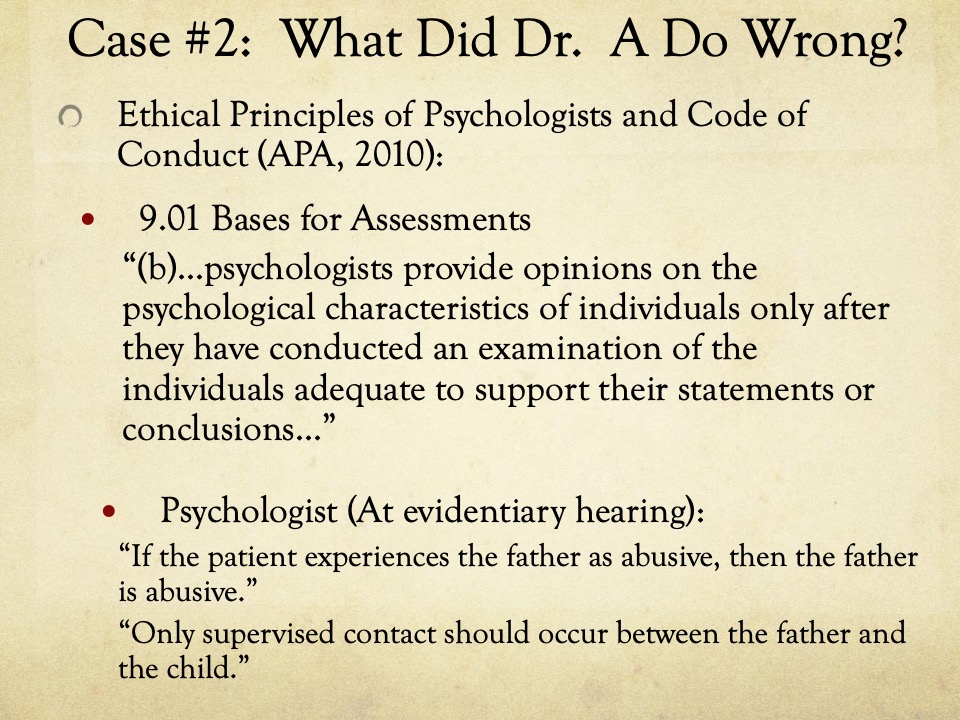
Here is a link to the APA code of ethics
- What does the Code mean by an adequate examination?
a. This is ambiguous, but there is a literature on how to competently perform a child custody evaluation.
Dr A clearly makes a custody/parenting time recommendation
b. Has the psychologist performed an adequate examination to make the recommendation for supervised contact, for to state that the father is sadistic or abusive
What do these concepts mean in a forensic setting? Do they take on a different meaning in a treatment situation (hypotheses that inform treatment) versus a forensic setting? I would argue that they do, based on Greenberg and Shuman
Is the psychologist competent to make a recommendation of only supervised contact?
That is unclear in this example, but in fact Dr A had no training in forensic psychology, no supervised experience, no experience in performing evaluations for the court, was not aware of the professional standards or guidelines on child custody evaluations (see below).
He was not aware of the standards courts use: the statutes that govern child custody, parenting time, nor the case law that courts in his jurisdiction use to make custody decisions.
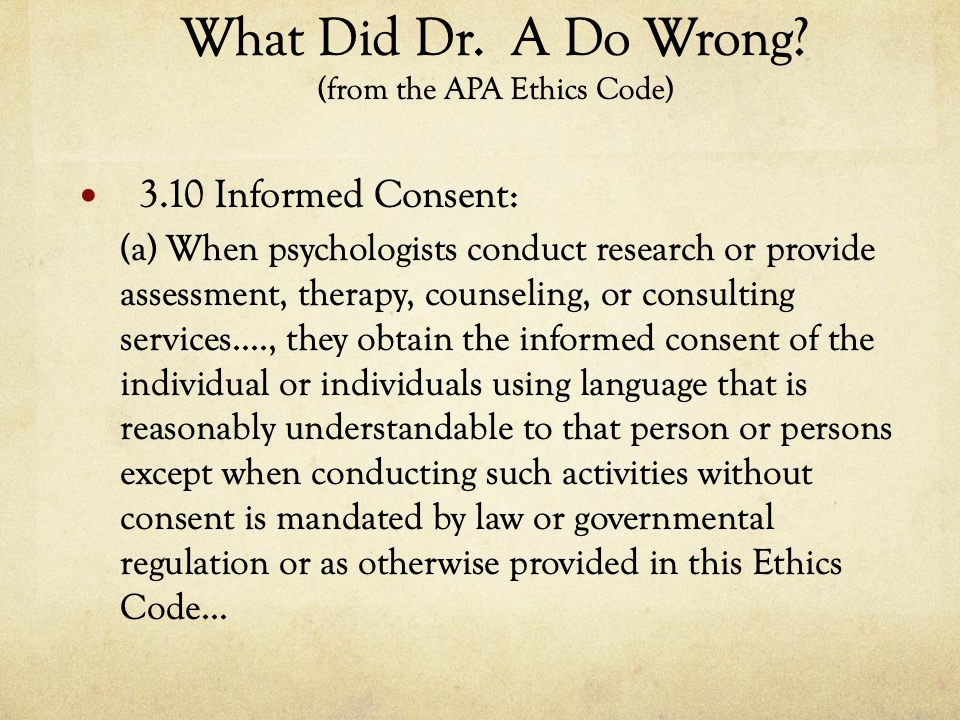
Informed Consent:
Did the CIT obtain informed consent for the eventual use of the information he gained from meeting with the mother or father?
Did he inform them of the potential uses of the information?
Did he get consent from the parents for the use of the information he gained from working with the child?
We don’t know if he made clear the relationship he would have with each person.
What about his role in this case? Did it shift, and were his roles conflicting?
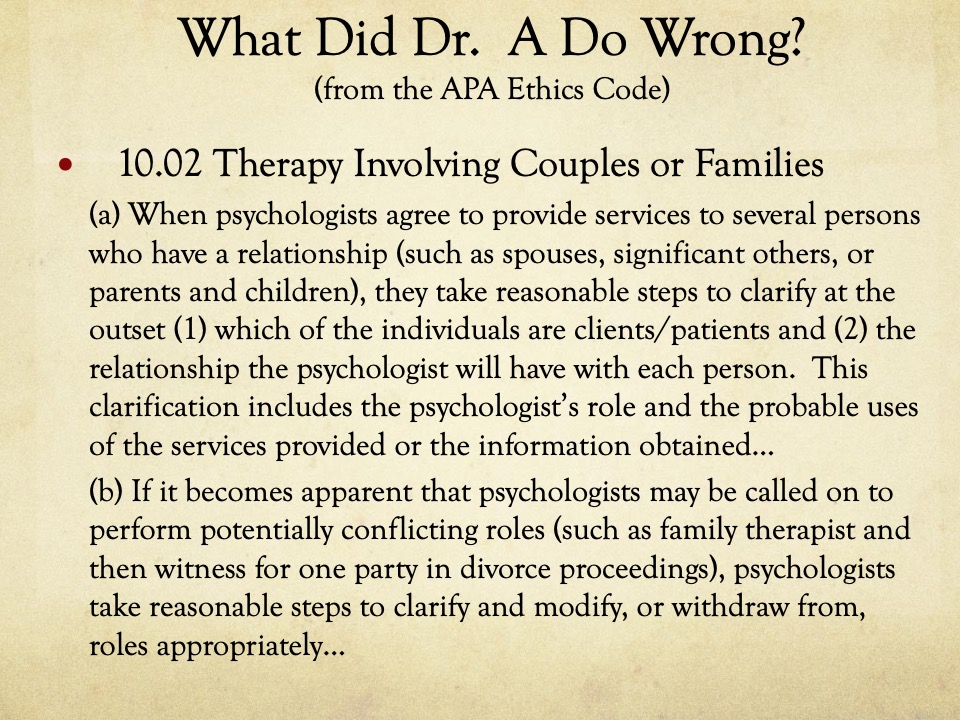
We don’t know if the psychologist made clear the relationship he would have with each person.
To whom did the psychologist owe the ethical obligations of Beneficence and Nonmaleficence ? (Psychologists strive to benefit those with whom they work and take care to do no harm)
Psychologists are supposed to protect the welfare and rights of those with whom they interact professionally and other persons who may be affected by their professional behavior.
Was the father the client as well as the child? Did the psychologist owe him a duty of confidentiality, and to obtain his permission to share information with the court?
Certainly the dad never felt that he was informed that information gained in the eval might be used to write a letter to the court regarding the issues of parenting time, supervision, custody, etc.
Could anyone be harmed?: the father by denial of contact with the child, the child by denial of contact with his father?
What about the psychologist’s role in this case? Did it shift, and were his roles conflicting?
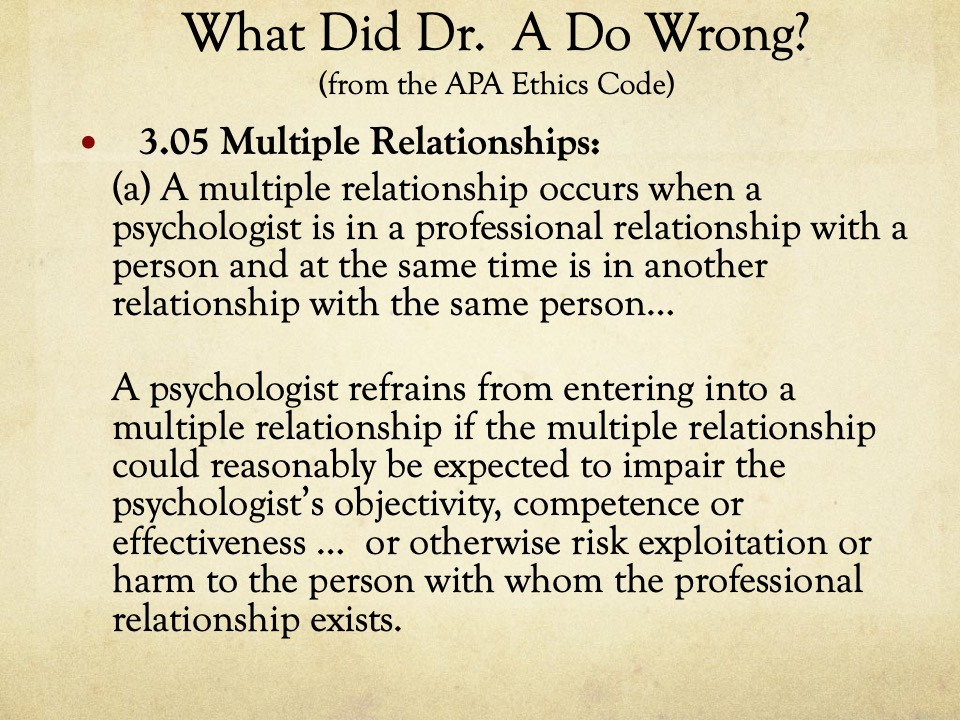
Dr A’s Defense:“I was only advocating for my client (the child).”
A multiple relationship occurs when a psychologist is in a professional relationship with a person and at the same time is in another relationship with the same person…
Is the therapist involved in a multiple relationship with the father of the patient (Treater and evaluator/forensic expert who offers a professional opinion on an issue before the court)? Yes!
Could this multiple relationship cause harm to anyone? Yes!
Is there a risk of impaired objectivity or effectiveness from adopting the multiple relationships? Yes!
Is the therapist engaging in multiple roles with respect to the patient, the patient’s father, and the court? Yes!
If the court did not follow his recommendation, and recommended joint legal custody to dad, and unsupervised parenting time, can the therapist work with both father and mother in the future? No.
Can he be objective if information is provided by the mother or father about the other parent? No.